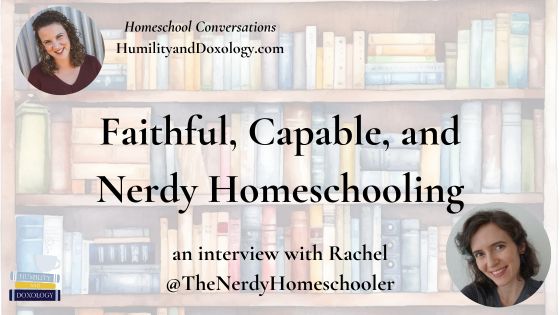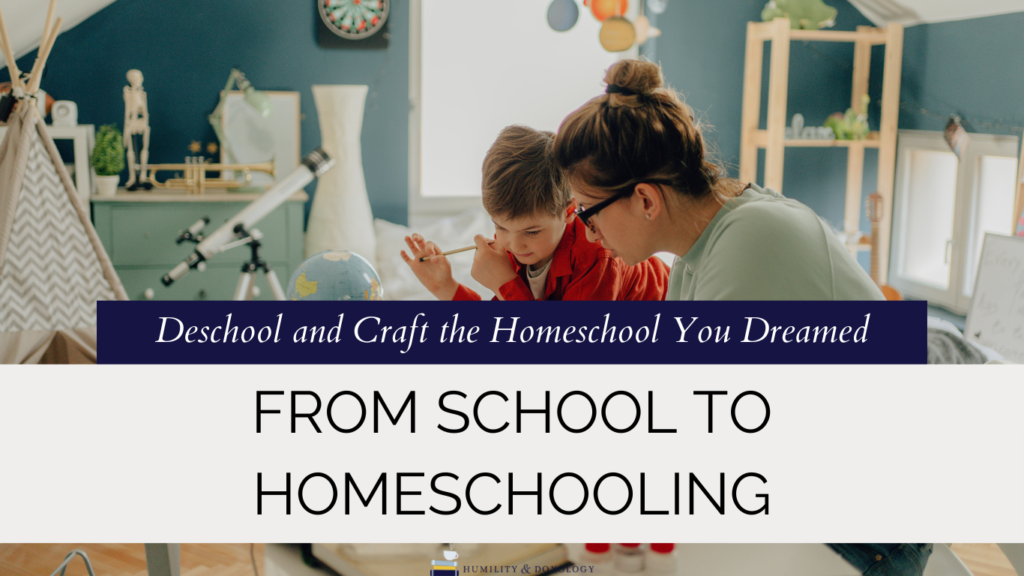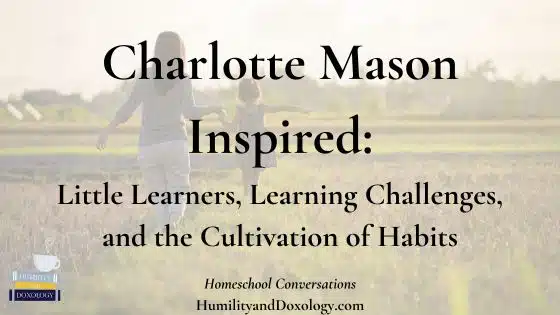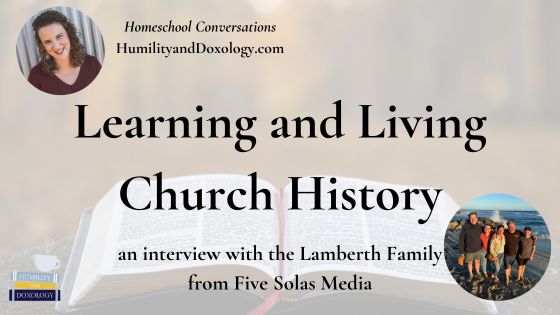In this episode of the Homeschool Conversations podcast, I’m chatting once again with the much-requested Rachel from The Nerdy Homeschooler (her channel was previously known as Seven in All). A second-generation homeschooler, curriculum writer, and mom of three boys, Rachel shares wisdom, perspective, and encouragement rooted in her lifelong experience with home education. The conversation ranges from battling homeschool stereotypes to embracing a nerdy love of learning.
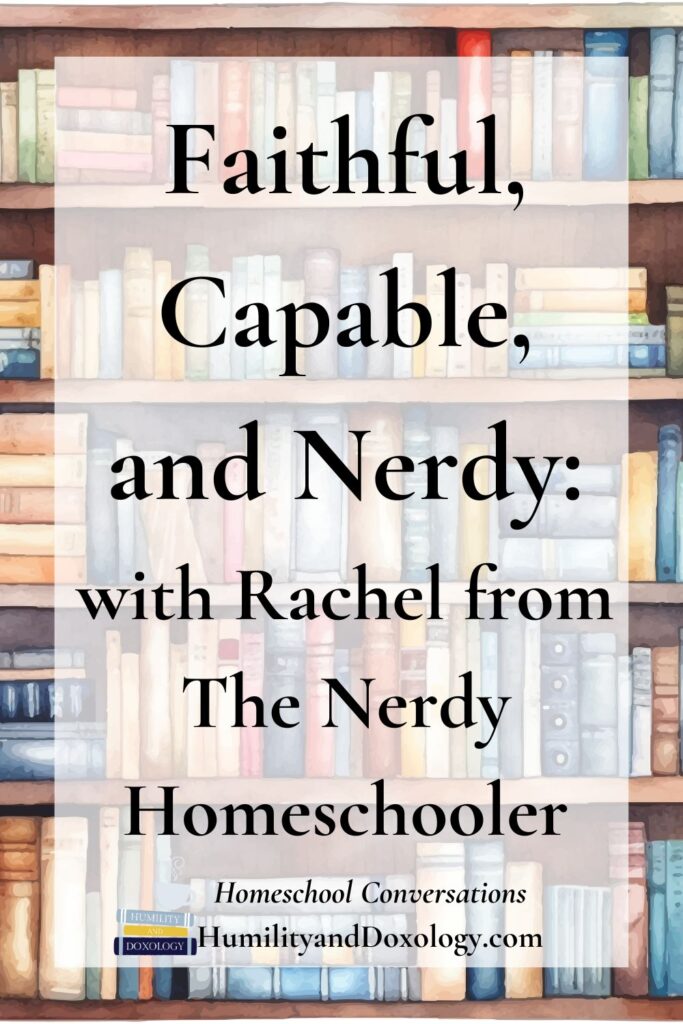
{This post contains paid links. Please see disclaimer.}
- From Homeschool Kid to Homeschool Mom
- The Real Challenge of Homeschooling? The Human Heart
- Beyond the False Dichotomy: Ditching Drama for Daily Faithfulness
- How to Homeschool Little Ones with Purpose (Without the Pressure)
- The Social Media Effect: Planning Overload, Implementation Fatigue
- Learning for Its Own Sake: Education Beyond Utility
- Why a Nerdy Homeschool YouTube Channel?
- Favorite Reads and Tips for Hard Days
- Where to Find Rachel
- Key Takeaways:
- Listen to the full podcast episode on Homeschool Conversations with Humility and Doxology
- You may also enjoy:
- Check out all the other interviews in my Homeschool Conversations series!

From Homeschool Kid to Homeschool Mom
Rachel was homeschooled from preschool through high school and recalls walking into her first college classroom as a completely new experience. Now, as a homeschool mom of three young sons (two school-aged and one lively toddler), she brings both lived experience and thoughtful intentionality to her own homeschool days. Her current season is full, chaotic, and joy-filled.
The Real Challenge of Homeschooling? The Human Heart
When asked about the most difficult aspect of homeschooling, Rachel didn’t hesitate: it’s not the academics. “The most challenging part of homeschool is the human element,” she said. Whether it’s physical illness, sin struggles, or just the daily friction of living in close proximity, the emotional and spiritual work of sanctification is the true challenge. She reminds listeners that the gospel meets us in this space: “His power is made perfect in weakness.”
Beyond the False Dichotomy: Ditching Drama for Daily Faithfulness
In the online homeschool world, it often seems like moms must choose between two extremes: the perfectionist ruled by a rigid schedule or the chaotic free-spirit who never met a to-do list. Rachel challenges this narrative. These extremes may go viral, she explains, but real life requires a better way: “Approaching homeschool as calm, capable, as a skilled educator with a purpose and a goal…is actually going to be more effective and more pleasant.”
Her own homeschool is “nerdy,” filled with grammar lessons, math worksheets, and lots of Spanish. It’s built on consistent routines, customized priorities, and realistic expectations.
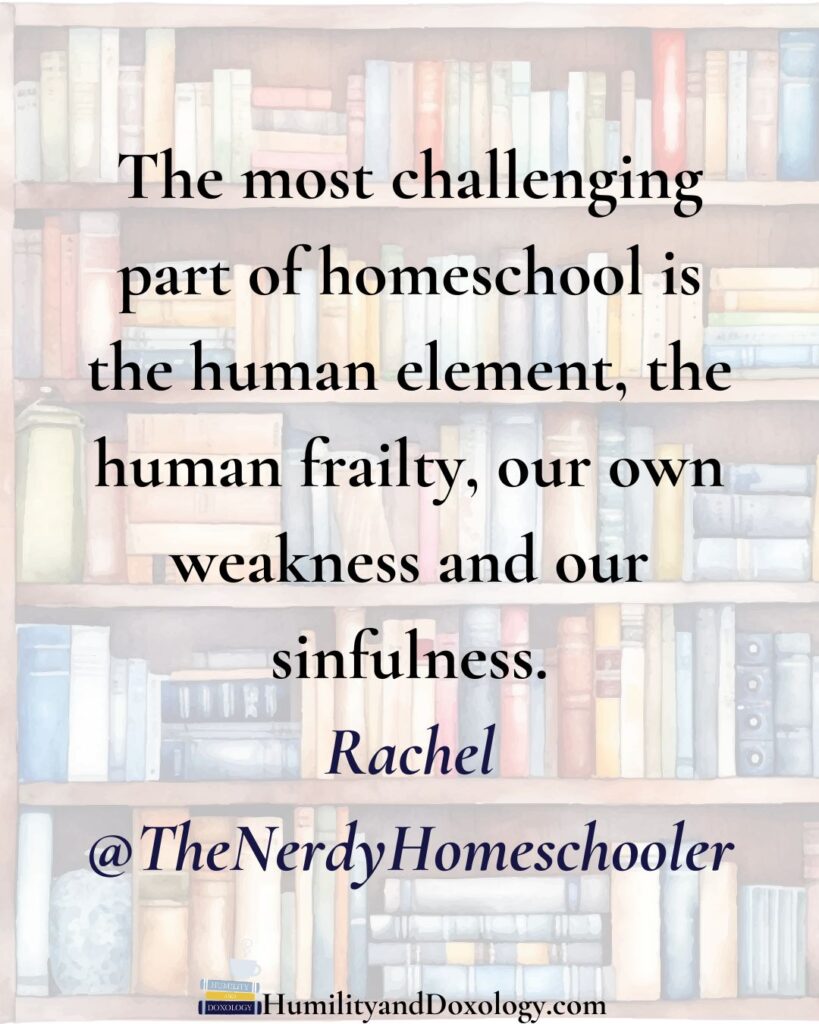
How to Homeschool Little Ones with Purpose (Without the Pressure)
Rachel offers gentle and practical advice for parents beginning the homeschool journey with young children. She cautions against dramatic advice that pits rigid curriculum against total free play. Her key priorities?
- Build Good Habits: Create consistent, daily learning routines that lay the foundation for future success.
- Communicate Big Ideas: Use the early years for foundational conversations about faith, family, and the world.
There’s time in the day for both intentional learning and plenty of play, she reminds us.
The Social Media Effect: Planning Overload, Implementation Fatigue
Rachel notes a unique challenge in today’s homeschool culture: overplanning and under-implementing. The temptation to perfectly coordinate every lesson plan and read-aloud often leads to burnout. She urges moms to invest their energy in faithful, consistent action rather than overcomplicated schedules: “Wake up every day and do the work.”
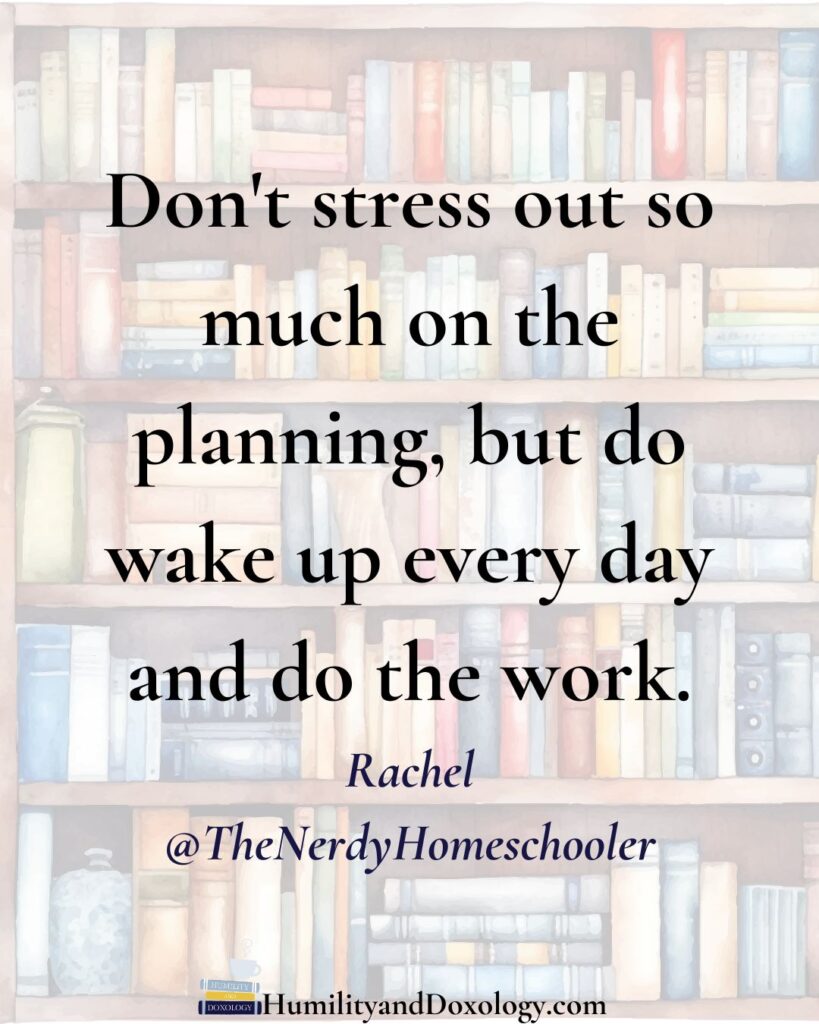
Learning for Its Own Sake: Education Beyond Utility
Rachel passionately rejects the idea that school subjects need to be “useful” in a practical sense to be worthwhile. She believes in the intrinsic value of learning: “The life of the mind is part of real life.” Education is an act of worship that helps us become more fully human, echoing the classical idea that the pursuit of truth and beauty shapes the soul.
Why a Nerdy Homeschool YouTube Channel?
Rachel created her The Nerdy Homeschooler (previously Seven in All) channel to be a voice for the joy of nerdy homeschooling. “Being passionate about homeschooling can be lonely,” she explains. Her videos serve as a place for like-minded moms to find encouragement, share ideas, and grow in their calling as educators. She loves hearing from fellow homeschool moms and being the cheerleader they may not have in real life.
Favorite Reads and Tips for Hard Days
Currently, Rachel is reading Awaking Wonder by Sally Clarkson and enjoying The Very, Very Far North with her kids. When homeschool days go sideways, her best advice is simple: pause, connect, and refocus on the purpose. Sometimes that includes prayer, a hug, and reminding everyone—yourself included—why you’re doing this in the first place.
Where to Find Rachel
You can find Rachel at:
- The Nerdy Homeschooler on YouTube
- @TheNerdyHomeschooler on Instagram
- WheredYouLearnThat.com – Curriculum and printables in English and Spanish
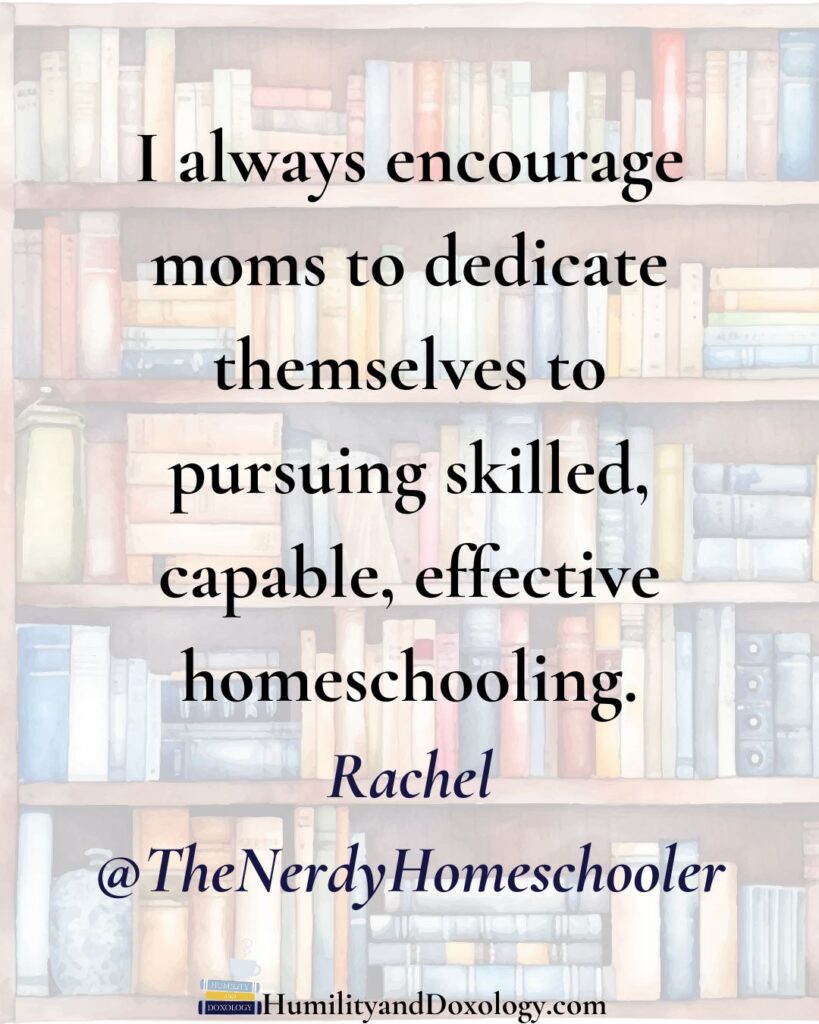
Key Takeaways:
- Homeschooling’s biggest challenge is the human heart, not the academics.
- Avoid the false choice between rigid perfectionism and chaos.
- Embrace your unique, even nerdy, homeschool style.
- Focus more on daily consistency than perfect plans.
- Early learning can include both structure and play.
- Excellence isn’t the same as perfectionism.
- Learning has value beyond practical usefulness.
- Grow in your homeschool skills; it’s a calling.
- Pause and connect when a day goes off track.
- Nerdy homeschool moms need community too!
Listen to the full podcast episode on Homeschool Conversations with Humility and Doxology
Rachel was homeschooled from PreK through 12th grade, but apparently that wasn’t enough. Today, she’s a second-generation homeschooler who also runs a Youtube channel, The Nerdy Homeschooler, where she talks about practical recommendations and resources for building a joy-filled homeschool. She’s also a homeschool curriculum writer, who, after writing content for larger curriculum companies, has launched her own site where she sells affordable homeschool resources, in English and Spanish.

You may also enjoy:
- Multilingual, Multicultural, Multigenerational Homeschooling (with Rachel from “Seven in All”)
- Resisting the Homeschool Stereotypes (with Gina Munsey)
- School vs. Education (with Mariel Howsepian)
Check out all the other interviews in my Homeschool Conversations series!
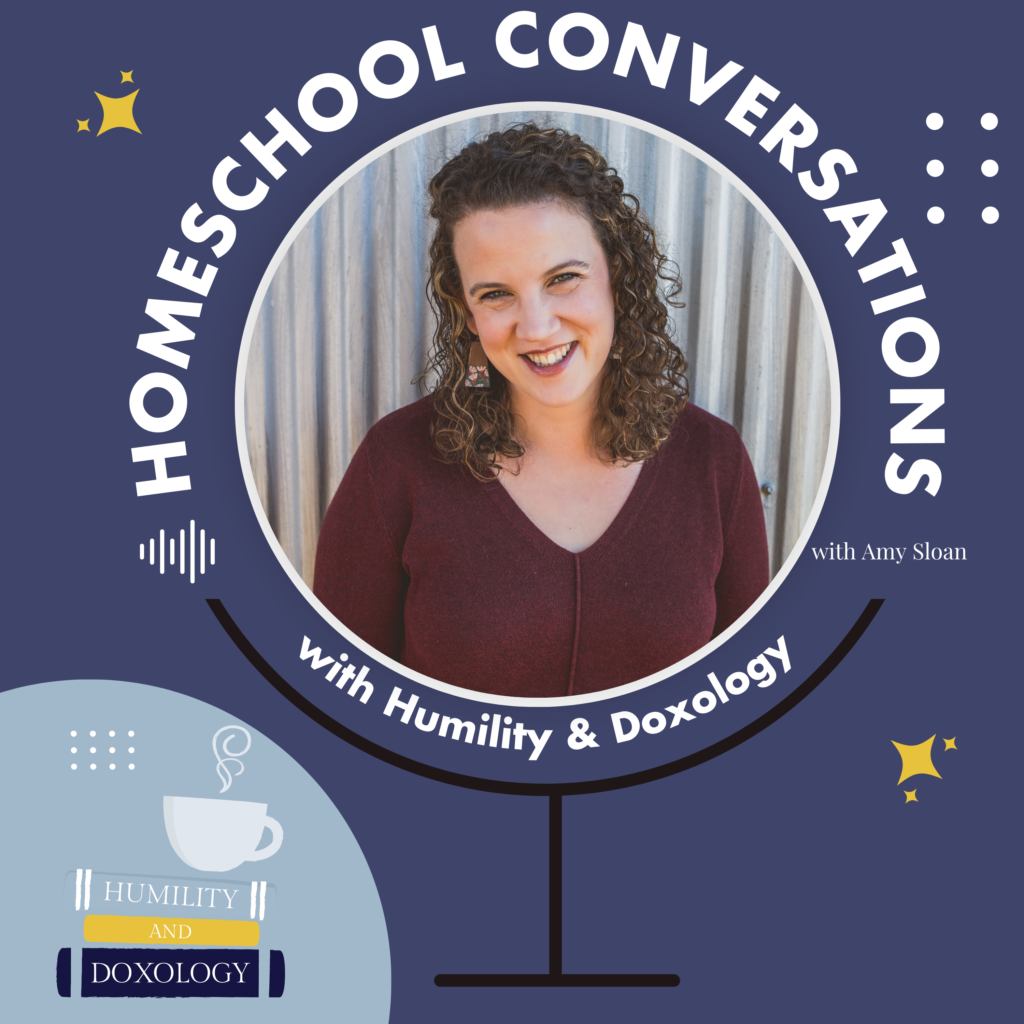
Amy Sloan: Hello, friends. Today, I am joined by a repeat guest and a favorite who has been requested by many people as a repeat guest. Rachel was homeschooled from pre-K through 12th grade, but apparently that wasn’t enough. Today, she is a second generation homeschooler who also runs a YouTube channel, Seven In All, where she talks about practical recommendations and resources for building a joy-filled homeschool. She’s also a homeschool curriculum writer who, after writing content for larger curriculum companies, has launched her own site where she sells affordable homeschool resources in both English and Spanish. And actually, I think that was one of the things we talked about last time. We talked about raising bilingual children and bilingual homeschooling. But today, we’re going to focus on a few other topics. But here at the beginning, tell us a little bit about yourself, your family and your background with homeschooling.
Rachel Seven in All: Well, yes, like you just heard, I was homeschooled myself my whole life. So the first time I was ever in a traditional school was actually walking into college on my first day. And, you know, it’s completely novel, experiencing the classroom and teachers and all of that. And then I graduated from college with a Bachelor’s of Arts degree, and got married very young. And I now have three young sons, two of whom are school age, and one who is a wild toddler, you know, just to add the chaos that you need in the homeschool day. So very full days with them right now. But loving it.
Amy Sloan: I sometimes will think back on those days as I now all my kids are old. I have 10 to 20 are my five now. And I have so many fond memories of the little years. It’s such a rich special time. But also it can be very exhausting.
Rachel Seven in All: Yes, yeah, both. Both can be true.
Amy Sloan: Yes. Well, what are some of the challenges that you have faced homeschooling? And maybe that’s yourself as the homeschool mom or memories as a teacher or as a student rather? And how have you sought to overcome those challenges?
Rachel Seven in All: Um, I really always very firmly feel that the most challenging part of homeschool is the human element, the human frailty, our own weakness and our sinfulness. So homeschool is not programming robots. And if it were, that would be easy. The straightforward education part tends to be a lot easier than wrestling with our own humanity, and that of our children. So whether that’s human frailty, you know, in the sense of physical sickness, or in the heart sickness, that is our battle with sin. That is the serious challenge that does tend to be more exhausting and draining than you know, just teaching the alphabet and math and talking about good literature. So how we meet this challenge, you know, that is really our hope as Christians, you know, in, it’s the challenge of all of life, knowing that by God’s grace, we get to meet this challenge with the knowledge that Jesus paid it all, that his blood is enough, that his grace is sufficient for us, that his power is made perfect in weakness. So, you know, homeschool is just kind of a microcosm of the whole rest of life. And leaning into the gospel is how we meet, you know, these deep challenges with wrestling with our own humanity and that of our children.
Amy Sloan: Yeah, I am more and more convinced that it is the gospel alone that brings hope and peace and joy and rest, all of those things that just as humans, let alone as homeschool moms, we desire. And I totally relate as well to what you’re saying. It’s not necessarily the academic part that’s the challenging part of homeschooling. It’s that like, I’m in a house filled with other sinners. And lo and behold, I bring my own sin to the table or the living room couch every time. But yet, that’s also because it’s that hard thing of our weaknesses rubbing up against each other. It’s also a place where you see God sanctifying and growing and bringing really amazing opportunities to repent and to grow as well.
Rachel Seven in All: Yeah, yes. And we often talk, you know, the constancy of homeschool being together so much is one of the great gifts in many ways. And it also is one of the reasons that it can be more challenging to have those personalities pressing up against each other all the time. Yeah, and all that. But it does give so many opportunities to learn how to love other people well, for ourselves and for our kids and what that looks like in day to day.
Amy Sloan: Oh, Rachel, one of the reasons why it’s always fun to chat with you and to to follow your work online is because I love that kind of second generation perspective that comes that you have that I can I can have as well sometimes. And sometimes we can maybe see some stereotypes or some blind spots in the homeschool community, just because we’ve kind of been around and seen a lot of different things. And I wanted to ask you about something I noticed a lot. And that is this, this sort of dichotomy that’s put out. You’re either this super organized, stressed perfectionist who’s like ruled by the curriculum and grids, and has destroyed the love of learning in their children. Or you’re the hot mess mom who never met like a goal list she liked and sort of lets her kids do whatever they want. And, you know, those are obviously extreme examples. But do you see this as maybe a false dichotomy, maybe even a place where we can put be putting our pride in one or the other identity? And then what would be, from your perspective, how a way that we can pursue a consistent, capable, calm homeschooling approach instead?
Rachel Seven in All: But, yeah, I think those who have watched some of my videos and read my posts do know that this is a topic that I do like to address. And that’s because social media, just the nature of it does lend itself toward the overdramatic and towards extremes, dramatic false dichotomies, because they are a lot more viral, you know, nuance doesn’t tend to go viral. So acting like there are two options and two options only is what you see a lot, that you can either be stressed out and exhausted, and your kids are stapled to a desk eight hours a day mindlessly competing, pleading boring worksheets, or you’re frolicking in the woods, you’re baking cookies, or you never met a worksheet, you’re just reading stories, letting the kids do whatever they want. And if the kid isn’t interested in learning about something, well, hey, connection over curriculum. So like, those are the two visions we’re getting. And I think when we get our eyes focused back on the real world, we can pretty quickly realize that these are not our only two options. They’re, and they’re not really the best options or the most realistic and most effective options for educating children. So speaking, speaking in these extremes will help you go viral. You know, if that’s the goal, and sometimes I guess it is. Having these overdramatic extremes definitely will make your reels more popular. They’ll just get more views. It’s just reality of how social media works. But if you get your eyes focused on the real world, you’ll notice that in the real world, people don’t tend to be that dramatic. Because the drama is not rewarded quite as much. So although it’s not viral content, it’s not clickbait. Approaching homeschool as calm, capable, as a skilled educator with a purpose and a goal in mind is actually going to be more effective and more pleasant for everyone involved that I don’t have to choose one identity, I can just look at the kids in front of me, figure out the goals and the priorities that are specific to my family, and do the work needed along the long path and the long marathon of homeschooling to work in that direction.
Amy Sloan: And what does that look like then for how you approach that and think about that first big picture on your own? And then as you implement that on a just ordinary Tuesday in your homeschool?
Rachel Seven in All: Yeah, so big picture, I do look at what’s priority to my family. And I always say my homeschool style is nerdy. So yes, we do do the books, we do do the worksheets, we do the grammar, and we enjoy it. We do the math worksheets. And I have a son who just loves math, and just calculates things all the time. So, you know, we are not shying away from academics, we enjoy that for its own sake. We do have some priorities, like mentioned before Spanish, we make Spanish a big part of our homeschool, a lot of people aren’t going to do that. But that’s something that suits our family’s needs and our family’s goals. So we kind of look at what our family wants. And look at our family’s lifestyle, which every family is going to have different situations. And then we plan for that, we adjust for that. And then in day to day, I work to make a plan that is actually something that I can accomplish. And I’m always going for, you know, something effective, it’s not going to be perfect, you know, at some point, the one year old is going to be on the table. And then he’s probably going to, you know, throw schoolbooks on the floor at some point, you know, like, things like that are going to happen. So I’m not looking for this, you know, perfectionist or dreamy view. But in the midst of, you know, everyday real life challenges, you can still be having very real learning, especially when you as a homeschool parent work on developing your own teaching skills, work on studying your own students to realize, okay, I know when you know this, and I know when you don’t know this. So constantly working on growing. And I think it does help to become more confident over time, when you can see the progress. And you can see that, hey, you know, I don’t have to worry about whether I’m doing a good job, because I can see the evidence that I am. And I can see the growth throughout our days. And that helps a lot to be pursuing routines that work and lessons that are effective. So yeah, I always encourage moms to dedicate themselves to pursuing skilled, capable, effective homeschooling. And what is effective will look different depending on what kids you have, what situations you have. But it’s still worth pursuing. And this idea absolutely gets misunderstood, I think. So I’ve written before about how and why I teach good handwriting skills in my homeschool. And if work is done sloppily, I’ll have it be redone. No, we’re not going to do the sloppy handwriting. And I’ll get comments in response to this, like, good luck paying for therapy for those kids, toxic perfectionism. And I just completely reject that. Actually, I, for me, I do not see building real skills and having standards worth meeting as the same thing as perfectionism. So, you know, perfectionism is an issue. I have a video on YouTube about how perfectionism can cripple a homeschool and how to combat it for those who naturally struggle with it. But it’s not actually just the teaching of useful skills or the mere having of standards and enforcing those standards that creates perfectionism. But we can communicate standards, we can communicate the why behind our standards, and work on effectively teaching to whatever those standards are.
Amy Sloan: I think that’s so important to make that distinction between pursuing excellence, and that not being the same thing as perfectionism, right? There’s idolatry or putting your, putting undue pressure that is inappropriate, a burden, you know, too heavy to bear, or seeing your value in something that you’ve accomplished. And that’s like idolatry. But that’s not the same thing as just seeking to do your work well, as to the Lord, right?
Rachel Seven in All: And when we are working with our kids day to day, we can get a pretty good sense for when they’re doing their work well, and when they were just definitely not trying at all. So it all comes down to knowing your kid.
Amy Sloan: Yeah. Well, another place, Rachel, I see, you know, some of these stereotypes, and maybe some of that, you know, that drama, and we got to make our viral reels. And another place that happens is a lot with homeschooling in the little years, homeschooling, our preschoolers, our young learners. So what advice would you give a new homeschooler who’s trying to navigate all this information and figuring out what they really need to be doing? What’s the best way to homeschool their their young learners?
Rachel Seven in All: Yeah, so for every family, early years will look different. Like so if you have your oldest child, early learning is probably going to look different with them versus with your youngest child. So just be prepared with that in mind. But I do caution all new homeschoolers to be wary of advice that seems more extreme and dramatic. I will see more times than I’d like many dramatic warnings contrasting the drudgery of miserable hours spent plugging away at preschool and kindergarten curriculum versus just simply letting your children play outdoors all day long. And I really want young parents to know that those are not your only two options. The days are long. As a stay at home mom to multiple young children, there are a lot of hours in the day. And you can effectively homeschool your preschooler, your kindergartner, you can teach active lessons that result in great progress, great character building, great exercise for their amazing, brilliant little minds. And they can also still play outdoors a lot. They can play indoors a lot. You know, there’s there’s time to do both. We really get the time through the choice to homeschool. And there are lots of developmentally appropriate preschool and kindergarten curriculums out there. In fact, I can’t say that I’ve seen the ones that require hours of boring worksheets. Maybe they’re out there. I just haven’t run into that many. But I’ve used preschool workbooks with my children that were just such a delight, you know, cutting and pasting and using scissors. My kids just love using scissors when they’re preschoolers, like the destruction factor was just so much fun. And I have even created preschool and kindergarten curriculums and have had a blast using them. So I would say, in the preschool years, my own big priorities and those I encourage to all new homeschool parents are number one, build good habits, and number two, communicate big ideas. So on the habits, you want to have a rhythm of consistent learning time with mama built into your daily routines. Because building those foundational habits of cooperating with the learning process will yield fruit for years to come. If you’ve been having these little daily learning sessions since as long as they can remember, you know, it’s not going to come as a surprise to them when they’re six or seven years old. And now you they need to sit down and do some work with mom. So having that habit, and just being able to cooperate, to be able to follow instructions to be able to say no, you know, we can sit down and listen right now. It really does yield a lot of fruit. And on the second one, communicating big ideas. That’s where I’m talking about big ideas about faith, about relationships, about how the world works and their role in their family and in their world. Preschoolers just naturally seem to ask so many questions. And I’ve seen these to be really foundational years for developing that worldview and developing their patterns of thinking. And you know, I just love talking to preschoolers. So it’s a you often you think of discussion based learning as like something you do in high school, but really, it starts very early, the conversations look different. And they might be more repeated again and again. But I love the questions they ask. And I I love getting to share my worldview with my kids from the earliest years. And to do that in conversations about good books, conversations with our schoolwork. And so those are my two big priorities is habits and big ideas.
Amy Sloan: I think that is such a helpful foundation. And then that can work out in many unique ways, right, for different families and different children. But having that as the foundation, and I agree also so many purposeful conversations and discussions can be had in those years that really set the foundation for having the kind of relationship with your child and the kind of relationship with learning and exploration that’s going to then impact the rest of your homeschool experience as well. Yeah. Well, Rachel, are there any other blind spots or stereotypes before we move on that you want to call out?
Rachel Seven in All: I just see that the social media age of homeschool is very, very different from preceding decades. And I’m sure you have noticed a good bit of this as well. One issue I feel that I see it tends to be over planning and under implementing. So I see many parents seeming to put a lot of effort into planning. They’re trying to perfectly coordinate their read alouds with the historical time period or the theme unit study. They’re writing down what lessons they’re going to do each day in their planners months in advance. They’re trying to pre plan ahead of time exactly how many lessons they will do each week to finish a curriculum by a certain month. So they’re doing all this kind of very complicated planning. But then when it comes to day to day implementation, I see so many reports of overwhelm, things getting dropped, suddenly realizing they haven’t done a certain subject in weeks, and so on. So I feel like there seems to be and probably fueled by social media a bit, a tendency to overcomplicate homeschool, or to invest a lot of energy onto the front end planning, while I would actually suggest spending more time and energy on your day to day implementation, realistically. And this comes from my own experience as a second gen homeschooler. So my mom was never out there pre planning all the days off for the school year, you know, because she did not know ahead of time when we would need days off. I never saw her try to schedule and predict when each one of us would finish every certain level of every one of our subjects. And I’ve really largely taken the same approach. So my mom never planned that we would finish, you know, fifth grade math on this day. But she did plan that we would wake up and we would do math every day. So we were very consistent. And the consistency of day to day implementation meant you didn’t really need that specific of planning. So I do plan, I do research, I prepare, but I keep the plan more to broad strokes. And I don’t really overthink it. I see people stressing out about, you know, which type of history cycle we should do and how many times are each one of my children going to get to go through the history cycle. And I just kind of feel like we don’t need to stress out as much about that end. And we should maybe put more of our energy into just waking up every day and doing the work. So you know, plan the big picture. Yeah. But let’s try to devote more of our energy, not so much to the perfectly coordinated plans. You know, I do read alouds. I don’t try to coordinate our read alouds with what we’re doing in history. I just read books that are good books at this point, especially because a lot of historical books aren’t that great for the ages of my children right now. So that’s one reason. But you know, you can also just read good books because they’re good. They don’t have to be perfectly matching something. So that’s kind of my general advice. Maybe don’t stress out so much on the planning, but do wake up every day and do the work.
Amy Sloan: That is such good advice. Exactly what I try to communicate to people, you know, that faithful consistency, that simple, ordinary thing you do, you know, every day or most days and you do it with joy, but just that consistency means so much more than coming up with some perfect ideal plan that you never actually implement, right? So that’s really, really important. And I think that is a good word for anyone who’s listening. Well, pivoting a little bit, I know that you mentioned earlier on about how you guys, you know, embrace the nerdy homeschool-ness. And someone might say, but Rachel, like, why are you educating and teaching these things that don’t matter in real life or that you’re never going to use? So what is the value of educating for things outside of their usefulness?
Rachel Seven in All: So yes, I must fundamentally communicate that I do not have a pragmatic view of education. I do not think that is solely for practical or useful purposes. I always want to argue that the life of the mind is indeed part of real life. So people want to separate ideas from practical life skills. But to me, I mean, don’t you want to have big ideas to mull over while you’re washing the dishes? Neither one, you know, we need both is what I would say. We need both. The mind grows from feasting on big ideas and from wrestling with different perspectives. So for me, learning and using the brain God gave me is very much part of worship. God did not make us purely for practical purposes. But as eternal beings, with the ability to think and learn and create, engage with others and with him. And I’ve really seen and really believe that many of the more impractical school subjects have great benefit when it comes to exercising the hearts and the minds God gave us. And I know that you have a great love for maybe some of these impractical school subjects for Shakespeare and the like, in your own homeschool.
Amy Sloan: Yeah, it’s funny, because I was actually just having this conversation with my oldest daughter recently. Because especially, you know, I’m in the classical world. And so people like to talk about, oh, how we don’t use these things because they’re practical or useful. You know, you don’t get any use out of Plato or Shakespeare. And Emma and I were saying, maybe we’re like using the word useful or practical actually, and in a wrong way, because Emma brought up the point, like, what could be more practical or more useful than being more fully human, right? Than being a wiser person, you know, think about Shakespeare and the rich depth of humanity of his characters, and how we are changed as we read and study those words. So it’s kind of interesting, I feel like we need to maybe define some of these terms, because they just get thrown around. But maybe we misunderstand what is useful and what is actually practical.
Rachel Seven in All: Yeah, when people are claiming you’ll never use this in real life, you’ll never use this in real life, it’s like, wait, what’s real life? Or what’s real life, you know, and then we go into philosophy. So how can you say we’re not using this?
Amy Sloan: Exactly, like, what is a good life, right? All of a sudden, we get really deep really fast. Which, you know, then that shows that we also share that, like, nerdy homeschool side, which is one of the reasons why I love, I love you. So tell me a little bit more about why you decided to have a nerdy homeschool YouTube channel and what you kind of hope to communicate there.
Rachel Seven in All: So I know that homeschooling itself can be a lonely road. And being passionate about homeschooling can be lonely, because in real life, you might not have anyone that you can like geek out over curriculum and schedules and lesson plans and teaching philosophy with. So my goal on YouTube is really to be that nerdy homeschool friend who is always going to be excited about planning and implementing homeschool. So someone that everyone else can feel gets their excitement. And I always say that my comments, my email inbox are open for anyone who just wants a listening ear as they’re planning and they’re implementing and they’re troubleshooting in their homeschool. I love calling my fellow homeschool moms further up and further in challenging us all myself included to be gradually more skilled at this great big job that we have taken on and just simply sharing the joy of nerdy homeschooling. And I know that nerdy homeschoolers who actually like academia for its own sake, can also feel a little bit like outsiders, even in the homeschool world. So I do always want folks to come along and feel hey, you know, I’m not alone. So that’s why I bring nerdy homeschool conversations to the internet.
Amy Sloan: And I think it’s so encouraging to how you always do really encourage us as homeschool moms to take our job seriously, to take this as a calling seriously, and to seek to become more skilled and more faithful in it, just like we would any other calling or vocation. It’s not just something we can just sort of wake up in the morning and do thoughtlessly, right? We ought to take it seriously. And I think that’s a really important encouragement. Well, I have enjoyed getting this chance to chat with you again. Here at the end, I’m going to ask you the questions that I ask all my guests. And so the first is, what are you personally reading lately?
Rachel Seven in All: Well, I’m always kind of cycling through a few books. My most homeschool mom classic one I’m reading right now is Awaking Wonder by Sally Clarkson. Never read that one before. More than halfway through it now. Oh, and chewing on the ideas there. And also a lot of what I read these days is really read aloud to my children. So I’m also reading The Very, Very Far North, and I highly recommend it. This one is hilarious to me. I love the characterization. Great.
Amy Sloan: I’ll have to add that one to my library hold list.
Rachel Seven in All: I love getting to the stage where my kids are old enough that the books I’m reading to them are a little bit more complex, a little more entertaining, which is really fun.
Amy Sloan: Yes. The final question I have for you is, what would be your best tip for turning around a homeschool day that seems to be going all wrong? I’m sure you’ve never had any of those.
Rachel Seven in All: Well, I would say, pause. Pause to communicate and redirect attention to what matters. You know, hey, what’s going on here? Because the meltdown is probably not about math, ultimately. Redirect to what’s the purpose of what we’re doing here? Usually taking just a few minutes to pause, to hug, and to redirect our hearts toward the purpose of these daily learning times that can be effective. A few minutes to figure out what is going on without getting totally sidetracked, because sometimes children will also use that opportunity. But sometimes just a quick pause and quick, hey, you know, we’re not trying to solve all the issues in the world and all the issues in life right now, but we are just trying to faithfully do the next little thing. Pause to calm, pause to connect. It’s not much use pushing through the lesson when your child needs more of a heart lesson in the moment. So, pausing to address the heart and even address the fact that our emotions and our desires are not even always truthful. They aren’t always right. And we can bring truth and purpose back into the situation, calm down, and then return back to work. Ideally.
Amy Sloan: Yeah. And sometimes even just taking that pause to pray. Sometimes I forget that night. Like, there’s an issue going on. I’m like, all right, well, let’s stop and let’s address this. And I just jump right in to try to fixing or solving the situation. My husband is much better than I am about consistently, first thing he does is like, let’s stop and pray. And then we move on to discussion. So, I’m trying to continue to grow in that. But sometimes we forget that pause. Like, if you’re having a hard time, take a moment and pray. Go to the throne of grace together, right? Mommy needs Jesus. You guys need Jesus. We all need together. And starting there, before we try to fix the pain point on our own. Absolutely. Rachel, where can people find you all around the internet?
Rachel Seven in All: So, I am on seveninall on YouTube and I share nerdy homeschool videos every week. It’s also seveninall on Instagram where I do share little snapshots of our own homeschool life and various thoughtful written posts on homeschooling and homeschool culture. And then I publish homeschool printables and curriculum at wheredyoulearnthat.com. Yep, that’s where you can find me.
Amy Sloan: And I will have all of those links in the show notes for this episode, humilityanddoxology.com. I would encourage you to take a minute and share this episode with another homeschool mom, maybe someone who needs that encouragement for faithful consistency or someone who would enjoy a little bit of nerdy homeschool life. So, Rachel, it is always a delight to chat with you and I’m glad you came back on. I know that several people actually I had asked, like, who do you guys want to see back on the podcast? And multiple people were like, Rachel from 7-in-all. So, they’ve been excited. I’m like, oh, I got you. I got you. Okay.
Rachel Seven in All: Well, thank you so much for having me. This was fun. And we didn’t even stay up too late past my bedtime. So, there you go.
Amy Sloan: Goodbye, Rachel. Thanks again.

